"The question first arises "what is a prostitute ?" To this the law answers, that it is one, who openly and with little or no distinction of persons, sells her favors for money : and who with this object endeavours to make herself publicly known as a prostitute. On the contrary, the woman, who does not court notoriety, but admits few lovers and in secret, although she receive money, cannot, and dare not, under penalty of damages for libel, be called a prostitute. This distinction is in Paris of great importance, for the police of that city exercise a surveillance over all the public prostitutes, who are obliged to eurol themselves in a registry, to receive sanitary visits &c., while they have no control over any other women. Hence the numbers, habits of life, and destiny of the prostitutes are much better known in Paris, than in any other city : and this gave M. Duchatelet facilities for gathering information, which he could have had nowhere else..."
.
George Drysdale. The Elements of social science… 1861
skip to main |
skip to sidebar
"Is she demi-monde ?" — Thus, one Insolent. " Nobody know !"


© Laure Deratte 2007/2008
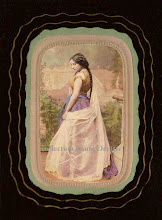
Céline Montaland. Photographie Mayer & Pierson. © Collection L. D (Fiche 740 du registre BB1 de la préfecture de police de Paris)
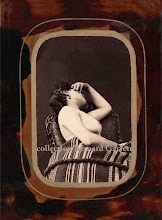
Nu à la couverture. Photographie Pesme. © Collection Bernard Garrett
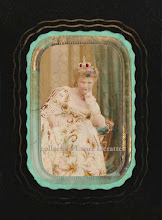
Hortense Schneider, "La Grande-Duchesse de Gerolstein". Offenbach. Photographie A.A.E. Disdéri. © Collection L. D (Fiche 385 du registre BB1 de la préfecture de police de Paris)
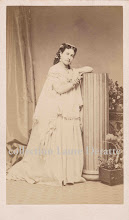
Crenisse. Photographie Ulrich Grob. © Collection L. D (Fiche 47 : Eugène Janvier de la Motte, du registre BB1 de la préfecture de police de Paris)

Eugène Janvier de la Motte. Photographie Franck. © Collection L. D (Fiche 47 du registre BB1 de la préfecture de police de Paris)
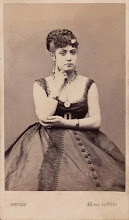+weyler+paris+1-1+10%25.jpg)
Marie Pellegrin. Photographie Weyler. © Collection L. D

Juliette Beau. Photographie A.A.E. Disdéri. © Collection L. D
.jpg)
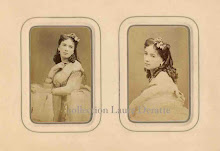
Cora Pearl. Photographie A.A.E. Disdéri. © Collection L. D (Fiche 183 du registre BB1 de la préfecture de police de Paris)
.jpg)
Cora Pearl. Carton d'invitation autographe. © Collection L. D
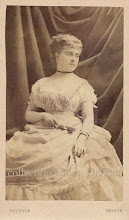
Blanche Pierson. Photographie Joseph Tourtin. © Collection L. D (Fiche 149 du registre BB1 de la préfecture de police de Paris)
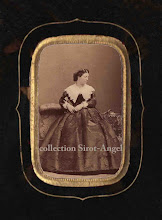
Alice Ozy. Photographie A.A.E Disdéri. © Collection Sirot-Angel
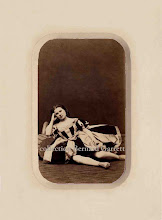
Danseuse. Photographie Mayer & Pierson. © Collection Bernard Garrett
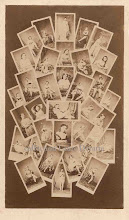
Célébrités théâtrales. Photographie Ulrich Grob. © Collection L. D
+copie.jpg)
Marguerite Badel. Mémoires de Rigolboche. © Collection Jean Pierre Faur. (Fiche 730 du registre BB1 de la préfecture de police de Paris)
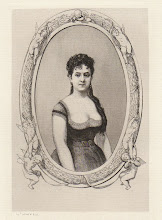.jpg)
Léonide Leblanc. Eau forte par Martial. Les jolies femmes de Paris. © Collection L. D
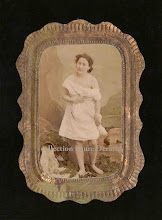
Léonide Leblanc. Photographie anonyme. © Collection L. D (Fiche 131 du registre BB1 de la préfecture de police de Paris)
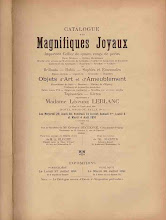.jpg)
Catalogue de la vente aux enchères des magnifiques joyaux de Madame Léonide Leblanc. 1891. © Collection Jean Pierre Faur
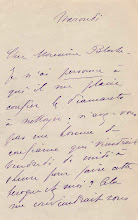.jpg)
Augustine Brohan. Lettre autographe. © Collection L. D
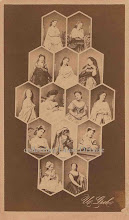
Célébrités théâtrales. Photographie Ulrich Grob. © Collection L. D
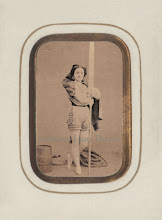
Jeanne Vizet dite Clairval. Photographie Constantin. © Collection L. D (Fiche 361 du registre BB1 de la préfecture de police de Paris)
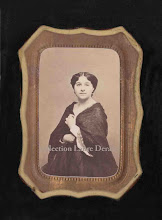
Céline Montaland. Photographie Barenne. © Collection L. D (Fiche 740 du registre BB1 de la préfecture de police de Paris)
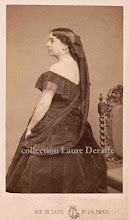
Céline Montaland. Photographie Léon Cremière. © Collection L. D (Fiche 740 du registre BB1 de la préfecture de police de Paris)
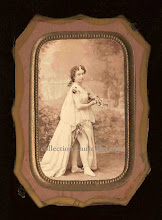
Lise Tautin. Photographie Mayer & Pierson. © Collection L. D. (Fiche 770 du registre BB1 de la préfecture de police de Paris)
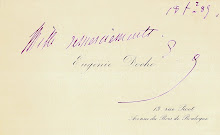.jpg)
Eugènie Doche. Carte de visite autographe "Mille remerciments". © Collection L. D
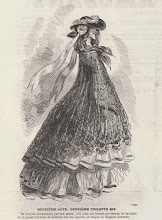
Les Toilettes de La Dame aux camélias, acte II, par Marcelin. Le Journal amusant. 22 novembre 1856. © Collection L. D
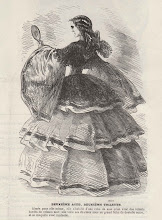
Les Toilettes de La Dame aux camélias, acte II, par Marcelin. Le Journal amusant. 22 novembre 1856. © Collection L. D
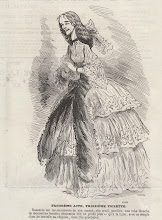
Les Toilettes de La Dame aux camélias, acte III, par Marcelin. Le Journal amusant. 22 novembre 1856. © Collection L. D
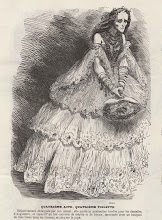
Les Toilettes de La Dame aux camélias, acte IV, par Marcelin. Le Journal amusant. 22 novembre 1856. © Collection L. D
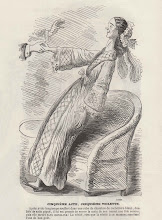
Les Toilettes de La Dame aux camélias, acte V, par Marcelin. Le Journal amusant. 22 novembre 1856. © Collection L. D
+thiebault+paris+1-1+10%25.jpg)
Alice Balanahi, dite Mariani. Photographie Thiebault. © Collection L. D (Fiche 471 du registre BB1 de la préfecture de police)
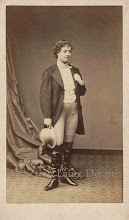
Alice Balanahi, dite Mariani. Photographie Ulrich Grob. © Collection L. D (Fiche 471 du registre BB1 de la préfecture de police)
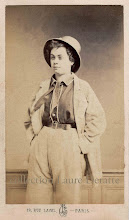
Paquêrette Kid. Photographie Léon Cremière. © Collection L. D
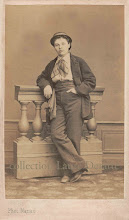
Femme travestie. Photographie Marius. © Collection L. D
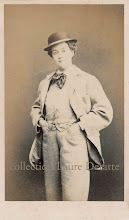
Honorine. Photographie Numa fils. © Collection L. D
Cora Pearl, Alice la provencale, Marie Cico, Hortense Schneider, Louise Bossi, Moïna, Juliette Beau, Marguerite Bellanger, Alice Ozy, Rigolboche, Irma Carabin, Finette, Blanche d'Antigny, Lise Tautin, Sarah Bernhardt, Aguillon, Mariani, Guilia Barrucci, Alphonsine, Régine Blondeau, Léontine Massin, Clémentine, Clotilde, Crénisse, Rose Deschamps, Ferraris, Granier, Thérèse Lachman dite la Païva, Georgina de Galliffet, Suzanne Lagier, Léonide Leblanc, Alice Régnault, Amélie Latour, Céline Montaland, Blanche Pierson, Eugènie Doche, Apollonie Sabatier, Soubise, Blanche Pierson, Suzanne Lagier, etc. etc. ...
un regard sous les dessous du second empire
"Is she demi-monde ?" — Thus, one Insolent. " Nobody know !"

"On appelle prostituées clandestines ou insoumises celles qui, vivant de leur corps, ont l’adresse de se soustraire à l’inscription, c’est-à-dire la surveillance spéciale et les visites sanitaires."
Julien François Jeannel. De la prostitution dans les grandes villes au XIXe siècle et de l’extinction des maladies vénériennes. 1868
Julien François Jeannel. De la prostitution dans les grandes villes au XIXe siècle et de l’extinction des maladies vénériennes. 1868

"les insoumises" est une exposition déposée à la société des auteurs et au copyright international
© Laure Deratte 2007/2008

Céline Montaland. Photographie Mayer & Pierson. © Collection L. D (Fiche 740 du registre BB1 de la préfecture de police de Paris)

Nu à la couverture. Photographie Pesme. © Collection Bernard Garrett
- Amélie Latour
- Alice Ozy
- Marthe Léocadie Bauman, dite Aguillon
- Blanche d'Antigny
- A miss Mary (Christmas)
- Blanche Pierson (bis)
- Sarah Bernhardt
- Marguerite Bellanger (Confessions)
- Tant que les parisiens s'amusent
- Mariani
- Pasca
- Ferraris
- Léonide Leblanc
- Alice Régnault
- Eugénie Doche
- La Dame aux camélias
- Lise Tautin
- Portraits-carte
- Céleste Mogador
- Alice la provencale
- Hortense Schneider
- Marguerite Bellanger
- Augustine Brohan
- Clémentine à l'escarpolette
- Cora Pearl
- Crénisse
- Rigolboche
- Prostitutes in Paris
- La Charge
- Marie Cico
- Blanche Pierson
- Clotilde
- Céline Montaland
Quelques courtisanes dans la collection de Ron Sheeley

Hortense Schneider, "La Grande-Duchesse de Gerolstein". Offenbach. Photographie A.A.E. Disdéri. © Collection L. D (Fiche 385 du registre BB1 de la préfecture de police de Paris)
"Le service de répression, dit service actif du dispensaire, compte aujourd'hui vingt-quatre inspecteurs sous la direction d'un officier de paix , d'un brigadier, et d'un sous-brigadier. Il est chargé exclusivement de la surveillance des maisons de prostitution dans Paris et la banlieue, de la recherche des prostituées insoumises et des fauteurs de la prostitution clandestine.
… La mission du service actif est extrêmement délicate et épineuse. Il faut, comme le dit Parent, des hommes de choix qui sachent allier la douceur à la fermeté, et qui possèdent surtout du tact et du discernement."
Parent-Duchâtelet, Trebuchet, Poirat-Duval. De la prostitution dans la ville de Paris: considérée sous le rapport de l'hygiène publique, de la morale et de l'administration. 1857
… La mission du service actif est extrêmement délicate et épineuse. Il faut, comme le dit Parent, des hommes de choix qui sachent allier la douceur à la fermeté, et qui possèdent surtout du tact et du discernement."
Parent-Duchâtelet, Trebuchet, Poirat-Duval. De la prostitution dans la ville de Paris: considérée sous le rapport de l'hygiène publique, de la morale et de l'administration. 1857

Crenisse. Photographie Ulrich Grob. © Collection L. D (Fiche 47 : Eugène Janvier de la Motte, du registre BB1 de la préfecture de police de Paris)

Eugène Janvier de la Motte. Photographie Franck. © Collection L. D (Fiche 47 du registre BB1 de la préfecture de police de Paris)
+weyler+paris+1-1+10%25.jpg)
Marie Pellegrin. Photographie Weyler. © Collection L. D
"Dans le courrant de la même année, la famille Pellegrin envoyat sa fille à Wiesbaden pour y faire de la prostitution, mais elle y tomba malade..."
Registre BB1 de la préfecture de police. Fiche 275. 1866
Registre BB1 de la préfecture de police. Fiche 275. 1866
-
Retour des courses - Gladiateur, cheval pur sang de l'écurie du comte Frédéric de Lagrange, vainqueur du derby d'Epson en 1865. Photographie L. Cremière. © Collection L. D "J...

Juliette Beau. Photographie A.A.E. Disdéri. © Collection L. D
.jpg)

Cora Pearl. Photographie A.A.E. Disdéri. © Collection L. D (Fiche 183 du registre BB1 de la préfecture de police de Paris)
.jpg)
Cora Pearl. Carton d'invitation autographe. © Collection L. D
" What ! that girl leaning forward ? Oh, that is a distinguished member of the demi-monde. She is but just arrived from Paris, where her beauty, her wit, and her profligacy were the theme of every tongue. I have met her there frequently, so, if you want an introduction I will give it to you
— her name is Cora Pearl."
— her name is Cora Pearl."

Blanche Pierson. Photographie Joseph Tourtin. © Collection L. D (Fiche 149 du registre BB1 de la préfecture de police de Paris)

Alice Ozy. Photographie A.A.E Disdéri. © Collection Sirot-Angel

Danseuse. Photographie Mayer & Pierson. © Collection Bernard Garrett
.
Je n'apprendrai rien à mes lecteurs et à M. Feydeau lui-même, en leur rappelant que la Vénus de Milo est plus chaste que la Vénus de Médicis ; que celle-ci est plus chaste que la Source de M. Ingres, laquelle, à son tour, est plus décente que la Vénus de M. Baudry, qui est beaucoup moins indécente que les statuettes de Pradier, qui sont moins immorales que ces photographies du coin, ou l'art est joué sous jambe par toutes les petites actrices des petits théâtres de Paris.
Armand Pontmartin. Dernières semaines littéraires. 1864
Armand Pontmartin. Dernières semaines littéraires. 1864

Célébrités théâtrales. Photographie Ulrich Grob. © Collection L. D
"Les hommes ont une manie bien désagréable, ils sont curieux comme des crinolines.
— Comment vous êtes-vous perdue ? demandent-ils tous. Qu'est-ce que ça leur fait ?...
On se perd quand on ne gagne pas assez, voilà tout."
Marguerite Badel. Mémoires de Rigolboche. 1864
— Comment vous êtes-vous perdue ? demandent-ils tous. Qu'est-ce que ça leur fait ?...
On se perd quand on ne gagne pas assez, voilà tout."
Marguerite Badel. Mémoires de Rigolboche. 1864
+copie.jpg)
Marguerite Badel. Mémoires de Rigolboche. © Collection Jean Pierre Faur. (Fiche 730 du registre BB1 de la préfecture de police de Paris)
.jpg)
Léonide Leblanc. Eau forte par Martial. Les jolies femmes de Paris. © Collection L. D

Léonide Leblanc. Photographie anonyme. © Collection L. D (Fiche 131 du registre BB1 de la préfecture de police de Paris)
.jpg)
Catalogue de la vente aux enchères des magnifiques joyaux de Madame Léonide Leblanc. 1891. © Collection Jean Pierre Faur
.jpg)
Augustine Brohan. Lettre autographe. © Collection L. D
Mercredi.
Cher Monsieur Bloche,
Je n’ai personne à qui il me plaise confier les diamants à nettoyer. N’avez-vous pas un homme de confiance qui viendrait vendredi de midi à une heure pour faire cette besogne chez moi ? Cela me conviendrait sous tous les rapports.
N’oubliez pas que nous avons différentes choses sérieuses à arrêter avant la vente.
Et, à ce sujet, comme je ne veux pas qu’il y ait d’erreurs soit de ma part, soit de la vôtre, nous prendrons note de ce qui sera convenu ; de cette façon, pas d’erreurs, pas de déceptions et surtout pas de surprises désagréables pour moi qui ne suis pas très au courant de la façon dont on procède pour le retrait de certains objets lors d’une vente.
A vendredi une heure n’est-ce pas ?
Et tous mes compliments.
Léonide Leblanc
Je n’ai pas vu le Comte Mazewski, mais je lui ai écrit. Il ignore que je vous ai dit qu’il me sert.
Lettre autographe. collection L.D
Cher Monsieur Bloche,
Je n’ai personne à qui il me plaise confier les diamants à nettoyer. N’avez-vous pas un homme de confiance qui viendrait vendredi de midi à une heure pour faire cette besogne chez moi ? Cela me conviendrait sous tous les rapports.
N’oubliez pas que nous avons différentes choses sérieuses à arrêter avant la vente.
Et, à ce sujet, comme je ne veux pas qu’il y ait d’erreurs soit de ma part, soit de la vôtre, nous prendrons note de ce qui sera convenu ; de cette façon, pas d’erreurs, pas de déceptions et surtout pas de surprises désagréables pour moi qui ne suis pas très au courant de la façon dont on procède pour le retrait de certains objets lors d’une vente.
A vendredi une heure n’est-ce pas ?
Et tous mes compliments.
Léonide Leblanc
Je n’ai pas vu le Comte Mazewski, mais je lui ai écrit. Il ignore que je vous ai dit qu’il me sert.
Lettre autographe. collection L.D

Célébrités théâtrales. Photographie Ulrich Grob. © Collection L. D

Jeanne Vizet dite Clairval. Photographie Constantin. © Collection L. D (Fiche 361 du registre BB1 de la préfecture de police de Paris)

Céline Montaland. Photographie Barenne. © Collection L. D (Fiche 740 du registre BB1 de la préfecture de police de Paris)
"Et puis ; elle a tant de charme, elle est si jolie !... Mais chut ! Céline déteste les fades compliments, et si vous voulez lui faire vraiment de la peine, vous n'avez qu'à lui parler de sa beauté."

Céline Montaland. Photographie Léon Cremière. © Collection L. D (Fiche 740 du registre BB1 de la préfecture de police de Paris)

Lise Tautin. Photographie Mayer & Pierson. © Collection L. D. (Fiche 770 du registre BB1 de la préfecture de police de Paris)
.jpg)
Eugènie Doche. Carte de visite autographe "Mille remerciments". © Collection L. D

Les Toilettes de La Dame aux camélias, acte II, par Marcelin. Le Journal amusant. 22 novembre 1856. © Collection L. D

Les Toilettes de La Dame aux camélias, acte II, par Marcelin. Le Journal amusant. 22 novembre 1856. © Collection L. D

Les Toilettes de La Dame aux camélias, acte III, par Marcelin. Le Journal amusant. 22 novembre 1856. © Collection L. D

Les Toilettes de La Dame aux camélias, acte IV, par Marcelin. Le Journal amusant. 22 novembre 1856. © Collection L. D

Les Toilettes de La Dame aux camélias, acte V, par Marcelin. Le Journal amusant. 22 novembre 1856. © Collection L. D
Archives du blog
+thiebault+paris+1-1+10%25.jpg)
Alice Balanahi, dite Mariani. Photographie Thiebault. © Collection L. D (Fiche 471 du registre BB1 de la préfecture de police)

Alice Balanahi, dite Mariani. Photographie Ulrich Grob. © Collection L. D (Fiche 471 du registre BB1 de la préfecture de police)
Une Lorette écrit:
Monsieur le préfet,
Désirant donner des coups de canne à une personne qui m’a insultée, je vous prie de me permettre de porter des habits d’homme.
Adolphine.
Monsieur le préfet,
Désirant donner des coups de canne à une personne qui m’a insultée, je vous prie de me permettre de porter des habits d’homme.
Adolphine.

Paquêrette Kid. Photographie Léon Cremière. © Collection L. D
Une autre:
Monsieur le préfet,
Éprouvant le besoin de prendre ma demie-tasse à l’estaminet, je vous prie de m’autoriser à porter des vêtements masculins.
Clara.
Monsieur le préfet,
Éprouvant le besoin de prendre ma demie-tasse à l’estaminet, je vous prie de m’autoriser à porter des vêtements masculins.
Clara.

Femme travestie. Photographie Marius. © Collection L. D
Une autre:
Monsieur le préfet,
Ayant été douée par la nature de moustaches qu’aucune poudre épilatoire ne peut extirper et étant dans la nécessité de me faire la barbe, comme vous, monsieur le préfet, veuillez me permettre de porter les habits de votre sexe.
Evelina.
Monsieur le préfet,
Ayant été douée par la nature de moustaches qu’aucune poudre épilatoire ne peut extirper et étant dans la nécessité de me faire la barbe, comme vous, monsieur le préfet, veuillez me permettre de porter les habits de votre sexe.
Evelina.

Honorine. Photographie Numa fils. © Collection L. D
LES INSOUMISES
Cora Pearl, Alice la provencale, Marie Cico, Hortense Schneider, Louise Bossi, Moïna, Juliette Beau, Marguerite Bellanger, Alice Ozy, Rigolboche, Irma Carabin, Finette, Blanche d'Antigny, Lise Tautin, Sarah Bernhardt, Aguillon, Mariani, Guilia Barrucci, Alphonsine, Régine Blondeau, Léontine Massin, Clémentine, Clotilde, Crénisse, Rose Deschamps, Ferraris, Granier, Thérèse Lachman dite la Païva, Georgina de Galliffet, Suzanne Lagier, Léonide Leblanc, Alice Régnault, Amélie Latour, Céline Montaland, Blanche Pierson, Eugènie Doche, Apollonie Sabatier, Soubise, Blanche Pierson, Suzanne Lagier, etc. etc. ...
Participez !!!
Vous avez une question à propos de l'exposition.
Vous avez une photographie ou une information, un texte, un lien qui vous semble manquer au sujet. Au contraire, vous voulez corriger une erreur et pensez que que certains éléments n'ont pas leur place sur ces pages ...
imagomurmura@gmail.com
Vous avez une question à propos de l'exposition.
Vous avez une photographie ou une information, un texte, un lien qui vous semble manquer au sujet. Au contraire, vous voulez corriger une erreur et pensez que que certains éléments n'ont pas leur place sur ces pages ...
imagomurmura@gmail.com

vbg.jpg)


.jpg)
cremi%C3%A8re+paris+1-1+10%25.jpg)